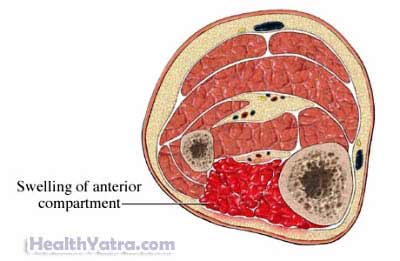Definition
Chronic compartment syndrome (CCS) occurs when pressure builds up within the body’s muscle compartments. Over time, this disrupts or blocks blood flow to the muscles. The result is pain, numbness, and tightness in the limb. CCS is often caused by intense exercise. It can affect the lower leg. But, it can also affect the arms, hands, feet, and buttocks.
Unlike acute compartment syndrome, CCS is not an emergency. But you should see your doctor to get treatment.

Causes
Under the skin of the arms and legs are sheets of connective tissue called fascia. These wrap around groups of muscles, nerves, and blood vessels. They create a unit called a compartment. When pressure builds up in these enclosed spaces, it has nowhere to go. The pressure is redirected into the compartment. When pressure reaches a certain point, it disrupts blood flow. In CCS, pressure builds gradually.
CCS is most commonly caused by:
- Intense exercise—may affect endurance athletes, especially runners
Risk Factors
These factors increase your chance of developing CCS:
- Participating in endurance sports, especially those involving running or jumping
Tell your doctor if you have any of these risk factors.
Symptoms
If you have any of these symptoms do not assume it is due to CCS. These symptoms may be caused by other conditions. Tell your doctor if you have any of these:
- Severe pain during exercise, but typically goes away within in an hour after stopping exercise
- Fullness or tightness in the muscle
- Tender, aching muscles
- Muscle weakness
- Numbness, tingling
- Pain on both sides of the body (most common), for example, both legs are affected
- In severe cases, foot drop (foot slaps hard on the ground when running)
Diagnosis
Your doctor will ask about your symptoms and medical history. He will also do a physical exam. Tests may include:
- Tests to measure pressure inside the compartments (eg, slit catheter, tonometer)
- Range-of-motion stretching—to assess damage
- MRI scan —a test that uses magnetic waves to make pictures of structures inside the body
- CT scan —a type of x-ray that uses a computer to make pictures of structures inside the body
Treatment
Talk with your doctor about the best treatment plan for you. Treatment options include the following:
Surgery
Surgery, called fasciotomy, is the main treatment for CCS. This is done to open the compartment and relieve pressure. The doctor makes a long slice into the fascia to open the envelope of tissue and relieve pressure. It takes about three months to recover. You will have to do physical therapy.
Nonsurgical Approaches
If you decide not to have surgery, your doctor may recommend that you:
- Stop the activity that is causing CCS and rest.
- Change your training routine.
- Do physical therapy.
- Take anti-inflammatory medications or muscle relaxants.
Prevention
To help reduce your chance of getting CCS, take the following steps:
- Avoid overexercising.
- Change your training routine.
